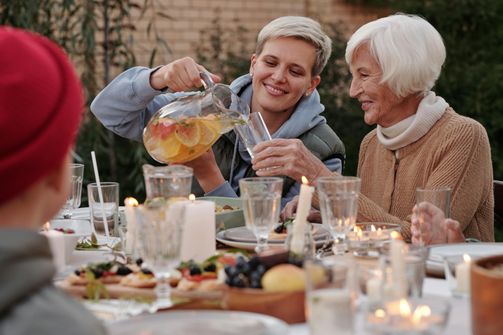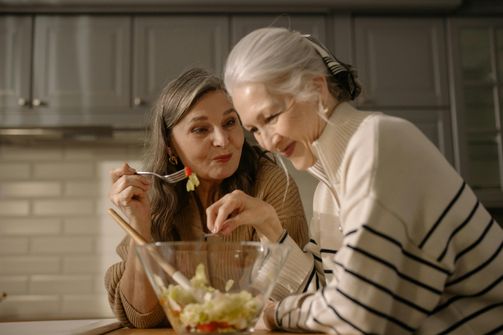
Longevity Lessons from Women in Blue Zones: How Their Lifestyle Can Inspire Healthier Living
Women from Blue Zones—regions of the world known for their high rates of longevity—live longer, healthier lives, often free from chronic disease well ...

In our fast-paced contemporary world, life often feels like an unending sprint against time; thus, the idea of longevity frequently seems elusive—almost unattainable. Yet it remains a truth: each one of us wields significant influence over both our lifespan and its quality; among all available tools at our disposal – exercise emerges as conspicuously potent.
Consistently, numerous studies have established the profound impact of exercise on women’s longevity; they reveal its ability to extend lifespan and reduce the risk of chronic diseases—factors that often curtail life expectancy. These investigations indicate that both moderate and vigorous forms of physical activity:
Regular physical activity enhances cardiovascular health by strengthening the heart, improving circulation, and reducing blood pressure. These factors collectively foster a robust cardiovascular system that diminishes risks associated with heart attacks, strokes and other complications of cardiorespiratory nature.
Exercise fortifies bones and muscles: it constructs and sustains bone density, lessening the threat of osteoporosis and fractures—particularly in aging women. In addition to this, exercise bolsters muscle strength; enhancing balance and coordination. Consequently, it serves as a preventive measure against falls or injuries.
Exercise crucially contributes to weight control and body composition management: maintaining a healthy weight links directly with reduced risk of contracting diverse chronic diseases, such as type 2 diabetes, heart disease—even certain cancers.
Exercise: empirical evidence demonstrates its capacity to diminish systemic inflammation levels—a pivotal factor in chronic disease development.
Exercise bolsters brain health: it amplifies cognitive function, refines memory—and spectrally diminishes the risk of dementia, Alzheimer’s disease and other age-associated cognitive decline.
Certain types of exercise, while all forms of physical activity are beneficial for longevity, offer more comprehensive advantages. A balanced exercise routine must include:
Aerobic exercise includes activities like brisk walking, running, swimming, cycling and dancing. These types of workouts enhance cardiovascular health; strengthen the heart and lungs; as well as boost energy levels: it is recommended to aim for a minimum of 150 minutes per week—this being classified under moderate-intensity aerobic exercises.
Strength training, involving the lifting of weights or utilization of resistance bands, actively constructs muscle mass: this process facilitates calorie burning—even in a state of rest; it also bolsters bone density and amplifies physical function. Therefore – one should aim for at least two sessions per week dedicated to these strength-training exercises.
Including flexibility exercises such as yoga, Pilates, and stretching in your routine at least once a week can enhance overall well-being by improving range of motion and reducing muscle stiffness.
Embracing a dynamic lifestyle may appear intimidating; however, even minute alterations can yield substantial results. Consider the following suggestions to integrate exercise into your daily routine:
Initiate on a modest scale, then progressively escalate: Avoid the temptation of overexerting yourself prematurely. Initiate with brief exercise sessions—as your fitness improves, augment both duration and intensity in gradual increments.
Discover the activities that truly captivate you; indeed, if exercise feels like a chore–your likelihood of consistent adherence decreases. Opt for pursuits: dancing, hiking or biking–that bring genuine enjoyment to your life.
Schedule exercise into your day as you would any other crucial appointment; treat it as an integral, non-negotiable part of your routine—a habit to be cultivated.
Discover a workout partner; exercising alongside a friend or family member offers not only motivation—but also accountability.
Do not shy away from experimentation; the possibilities for exercise are indeed infinite. Engage in a myriad of activities—until you discover one that not only brings you joy but also aligns with your lifestyle.
Engaging in exercise surpasses mere attainment of a specific physique or competition with others; it necessitates an investment in your health and well-being. You empower yourself to live not just longer, but also healthier—and consequently more fulfilled—by integrating consistent physical activity into your routine. Through this act of self-care, you bestow upon yourself the gift of longevity: a unique opportunity to seize all that life presents.

Women from Blue Zones—regions of the world known for their high rates of longevity—live longer, healthier lives, often free from chronic disease well ...

As science advances, it’s becoming clear that nutrition is not a one-size-fits-all solution. Enter nutrigenomics, a field of research that explores ho...

As women age, the nutritional needs of their bodies change, and so does the focus on maintaining health through diet. For women over 50, the omnivore ...

The connection between what we eat and how we feel is powerful—certain foods provide the nutrients our brain needs to support mood, energy, and overal...

Social gatherings often mean a spread of carb-heavy foods and tempting desserts that can make sticking to the carnivore diet feel tricky. But with a b...